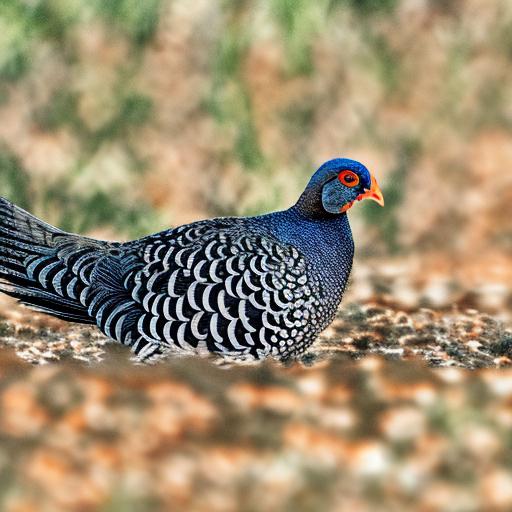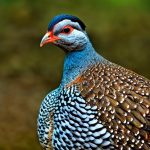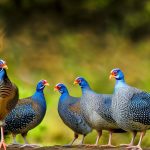Guinea fowl, also known as pintades, are domesticated birds that are native to Africa. They are popular for their unique appearance, with their speckled feathers and distinctive call. Guinea fowl are often kept for their meat, eggs, and pest control abilities. They are hardy birds that can adapt to a variety of climates and are relatively low maintenance, making them a popular choice for small-scale poultry farming. Guinea fowl are social birds that thrive in small flocks, and they are known for their alert and curious nature. They are also excellent foragers and can help control insect populations in the areas where they roam.
Guinea fowl are known for their loud calls, which can serve as a natural alarm system to alert other birds and animals of potential danger. They are also known for their ability to consume large quantities of ticks, flies, and other pests, making them valuable for pest control on farms and in gardens. Guinea fowl are also valued for their flavorful meat, which is lean and rich in protein. Their eggs are smaller than chicken eggs but are prized for their rich flavor and high nutritional value. Overall, guinea fowl are versatile birds that can provide both practical benefits and enjoyment for those who raise them.
Key Takeaways
- Guinea fowl are hardy birds known for their pest control abilities and flavorful meat
- Common causes of guinea fowl deaths include predators, disease, and accidents
- Signs of illness in guinea fowl include lethargy, decreased appetite, and abnormal droppings
- Preventative measures for guinea fowl health include providing a safe and secure coop, regular health checks, and proper nutrition
- Veterinary care for guinea fowl may include vaccinations, parasite control, and treatment for injuries
- Proper nutrition is essential for the health and well-being of guinea fowl, including a balanced diet of grains, greens, and protein
- Ensuring the health and well-being of guinea fowl requires a combination of preventative measures, veterinary care, and proper nutrition.
Common Causes of Guinea Fowl Deaths
Guinea fowl, like any other poultry, are susceptible to a variety of health issues that can lead to illness and death if not properly managed. Some common causes of guinea fowl deaths include predation, disease, accidents, and environmental factors. Predation is a significant threat to guinea fowl, as they are ground-dwelling birds that are vulnerable to attacks from predators such as foxes, raccoons, hawks, and even domestic dogs. It is essential to provide secure housing and fencing to protect guinea fowl from predators, especially at night when they are roosting.
Disease is another common cause of guinea fowl deaths, with respiratory infections, parasites, and nutritional deficiencies being significant contributors. Respiratory infections can be caused by poor ventilation in housing or exposure to damp and cold conditions. Parasites such as mites, lice, and worms can also weaken guinea fowl and make them more susceptible to other illnesses. Nutritional deficiencies can result from inadequate feeding or imbalanced diets, leading to poor growth, weakened immune systems, and increased susceptibility to disease. Accidents such as injuries from fights with other birds or getting caught in fencing or other structures can also result in fatalities. Lastly, environmental factors such as extreme temperatures, humidity, and toxic plants can also pose risks to the health and well-being of guinea fowl.
Signs of Illness in Guinea Fowl
Recognizing the signs of illness in guinea fowl is crucial for early intervention and treatment to prevent further complications or fatalities. Some common signs of illness in guinea fowl include changes in behavior, such as lethargy, isolation from the flock, decreased appetite, and reduced vocalization. Physical symptoms may include abnormal droppings, such as diarrhea or blood in the feces, disheveled feathers, labored breathing, nasal discharge, and swelling or abnormalities in the eyes or feet. Additionally, changes in egg production or quality can also indicate underlying health issues in female guinea fowl.
It is essential to observe guinea fowl regularly to monitor their behavior and physical condition. Early detection of illness can significantly improve the chances of successful treatment and recovery. Quarantining sick birds from the rest of the flock can help prevent the spread of contagious diseases and allow for focused care and observation. Seeking veterinary advice and intervention is crucial when dealing with suspected illness in guinea fowl to accurately diagnose the issue and implement appropriate treatment measures. Regular health checks and proactive management practices can help minimize the risk of illness and ensure the overall well-being of guinea fowl.
Preventative Measures for Guinea Fowl Health
Preventative measures play a crucial role in maintaining the health and well-being of guinea fowl. Providing a suitable living environment is essential for minimizing stress and exposure to potential health hazards. This includes secure housing to protect against predators, adequate ventilation to prevent respiratory issues, and proper sanitation to reduce the risk of disease transmission. Access to clean water and a balanced diet is essential for meeting the nutritional needs of guinea fowl and supporting their overall health. Regular monitoring of feed consumption, egg production, and body condition can help identify any potential issues early on.
Implementing biosecurity measures can help prevent the introduction and spread of diseases within a flock. This includes limiting contact with wild birds and other poultry, practicing good hygiene when handling birds and equipment, and quarantining new additions to the flock before introducing them to existing birds. Vaccinations may also be recommended to protect against specific diseases prevalent in the area. Additionally, providing opportunities for exercise and foraging can help promote physical activity and mental stimulation for guinea fowl, contributing to their overall well-being. Overall, proactive management practices that prioritize prevention can significantly reduce the risk of illness and mortality in guinea fowl.
Veterinary Care for Guinea Fowl
While guinea fowl are generally hardy birds, there are instances where veterinary care may be necessary to address health issues or injuries. Finding a veterinarian with experience in avian medicine is essential for ensuring the proper care and treatment of guinea fowl. Regular health checks can help identify any potential issues early on and allow for timely intervention. Veterinary care may also be necessary for administering vaccinations, treating injuries, managing parasite infestations, or addressing specific health concerns such as respiratory infections or nutritional deficiencies.
In cases of illness or injury, seeking veterinary advice is crucial for accurate diagnosis and treatment. This may involve diagnostic tests such as blood work or fecal analysis to identify underlying health issues. Treatment options may include medications, dietary supplements, or supportive care to aid in recovery. Additionally, veterinarians can provide guidance on preventative measures and management practices to promote the long-term health and well-being of guinea fowl. Establishing a relationship with a knowledgeable avian veterinarian can provide peace of mind for guinea fowl owners and ensure that their birds receive the best possible care when needed.
Importance of Proper Nutrition for Guinea Fowl

Proper nutrition is essential for supporting the health and productivity of guinea fowl. A balanced diet that meets their nutritional requirements is crucial for promoting growth, maintaining immune function, and supporting reproductive health. Guinea fowl require a diet that is high in protein to support muscle development and egg production. Commercially formulated poultry feeds designed specifically for guinea fowl can provide the essential nutrients they need, including protein, vitamins, minerals, and amino acids.
In addition to commercial feeds, guinea fowl can benefit from access to fresh greens, insects, and grit for digestion. Foraging opportunities can help supplement their diet with natural sources of protein and essential nutrients while providing mental stimulation and exercise. It is important to provide access to clean water at all times to prevent dehydration and support overall health. Monitoring feed consumption and adjusting feeding practices based on seasonal changes or specific nutritional needs can help ensure that guinea fowl receive adequate nutrition throughout their life stages. Overall, proper nutrition plays a critical role in promoting the health and well-being of guinea fowl.
Ensuring the Health and Well-being of Guinea Fowl
In conclusion, maintaining the health and well-being of guinea fowl requires proactive management practices that prioritize prevention, observation, and proper care. Recognizing common causes of guinea fowl deaths such as predation, disease, accidents, and environmental factors is essential for implementing preventative measures to mitigate these risks. Monitoring for signs of illness in guinea fowl and seeking veterinary care when needed can help address health issues early on and improve the chances of successful treatment.
Providing a suitable living environment, implementing biosecurity measures, offering a balanced diet, and seeking veterinary advice when necessary are all important components of ensuring the overall health and well-being of guinea fowl. By prioritizing preventative measures and proactive management practices, guinea fowl owners can help minimize the risk of illness and mortality while promoting the long-term health and productivity of their birds. With proper care and attention, guinea fowl can thrive as valuable additions to small-scale poultry operations or backyard flocks while providing practical benefits and enjoyment for those who raise them.
If you’re struggling with guinea fowl keep dying, it might be time to reassess your coop setup. A well-designed coop can make a significant difference in the health and well-being of your poultry. Check out this informative article on what kind of coop is best for chickens to ensure that your guinea fowl have a safe and comfortable living environment.
FAQs
What are common reasons for guinea fowl deaths?
Guinea fowl can die from a variety of reasons including predation, disease, parasites, environmental factors, and accidents.
How can I protect my guinea fowl from predators?
To protect guinea fowl from predators, it is important to secure their coop or housing at night, use fencing to create a safe outdoor area, and consider using guard animals such as dogs or llamas.
What diseases are common in guinea fowl?
Common diseases in guinea fowl include respiratory infections, coccidiosis, and avian pox. It is important to consult with a veterinarian for proper diagnosis and treatment.
How can I prevent disease in my guinea fowl?
Preventative measures for disease in guinea fowl include maintaining a clean living environment, providing proper nutrition, and practicing good biosecurity measures.
What parasites affect guinea fowl?
Guinea fowl can be affected by external parasites such as mites and lice, as well as internal parasites like worms. Regular monitoring and treatment can help prevent parasite-related deaths.
What environmental factors can contribute to guinea fowl deaths?
Extreme temperatures, poor ventilation, and overcrowding can all contribute to guinea fowl deaths. Providing a suitable living environment is crucial for their well-being.
What should I do if my guinea fowl keeps dying?
If you are experiencing repeated guinea fowl deaths, it is important to assess their living conditions, consult with a veterinarian, and consider implementing changes to improve their health and safety.
Meet Walter, the feathered-friend fanatic of Florida! Nestled in the sunshine state, Walter struts through life with his feathered companions, clucking his way to happiness. With a coop that’s fancier than a five-star hotel, he’s the Don Juan of the chicken world. When he’s not teaching his hens to do the cha-cha, you’ll find him in a heated debate with his prized rooster, Sir Clucks-a-Lot. Walter’s poultry passion is no yolk; he’s the sunny-side-up guy you never knew you needed in your flock of friends!







